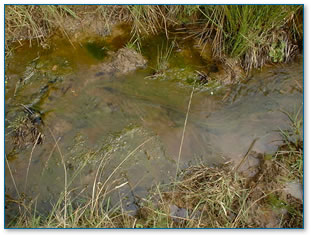dirty
water
 |
Farm buildings
without gutters |
Water used for washing areas
of the farm such as the yard or dairy often mixes with farm waste
(manure or slurry for example) and is then known as ‘dirty
water’. Rainwater can also become 'dirty water' if it runs
over the yard picking up farm waste on the way. The harmful substances
that the water now contains could drain off the yard and enter streams
and rivers if it is not diverted and treated first.
The best way of tackling the
problem of dirty water is to try and prevent water becoming dirty
in the first place. There might be cattle yards or silos on the
farm that do not have roofs and so rainwater falls into these areas
and washes over whatever is contained there. By roofing these areas
this could be prevented. In this way the farmer is avoiding the
problem of dirty water.
There may be broken gutters or
downpipes on the farm that need repairing or perhaps cannot cope
with heavy rain. By making sure that these are kept in good condition
clean rainwater is prevented from overflowing onto the mucky farmyard
and becoming dirty. Clean rainwater can also be saved and used on
the farm for washing or stock drinking. Clean water from the tap
is very expensive if used in large quantities, and using natural
rainwater can save money.
There are other ways in which
farmers can prevent water becoming dirty. A device to separate dirty
water and clean water could be installed on the farm to stop clean
water becoming dirty when it reaches the farm buildings and surfaces.
 |
Nutrient pollution
in stream |
A farmer could also look at the
way clean water is used on the farm and whether the amount of dirty
water produced could be reduced. For example clean water is used
to wash animal dung (farmyard manure) from yards and barns on the
farm. By using a brush to remove the dung before washing down the
area the amount of clean water used could be reduced.
Dirty water is normally
applied or diverted through ditches onto farmland and sometimes
the nutrients (G1)
in it are not fully valued. The dirty water might be a good source
of fertiliser, containing potash and nitrogen (see
fertilisers W07b) to help crops grow without having to buy and
apply other fertiliser. This benefits the environment and saves
the farmer money!
|

